Will Sellers: The Monroe Doctrine turns 200

When James Monroe addressed Congress 200 years ago, many assumed his annual message would be limited to legislative initiatives. Since he had no spin doctors to help him explain his position, clarify its broad impact, or narrate its context, it was left to him to simply announce the Monroe Doctrine and let others decide its ramifications. Two centuries ago, the New World was shedding Old World political connections as new nation-states were emerging after achieving independence. President Monroe clearly understood the general feelings of his fellow countrymen and realized that the unique American experience provided him a forum to declare his nation’s place in the World Order. The Monroe Doctrine is remembered primarily for its bold limitation on European influence and colonization in the Western Hemisphere, but other parts of the doctrine were of equal importance and expressed American sentiments about the rest of the world. Specifically, the doctrine stated that America had no interest in conflicts in Europe but would respect the existing order in the New World. When viewed in hindsight, the doctrine was in many ways a concise statement of how America viewed the world and coupled its role with a tinge of isolationism. President Monroe told the entire world that the Western Hemisphere was off-limits to European powers. It was a bold move for a nation that was not yet 50 years old and had no military to enforce the policy, but the policy was supported by George Washington’s admonition that America not involve itself in foreign wars. The American Revolution changed the dynamics of foreign policy, foreign trade, and foreign investment. Once the revolution ended, wars in Europe waxed and waned with alliances that switched and boundaries that moved so frequently that it was hard to keep an accurate tally. Monroe understood that America had no interest in these changing relationships and was ill-suited to fully appreciate the dynamics of European diplomatic intrigues. Monroe’s main interest was preserving a sphere of influence with America as the dominant power. There was no need to allow this continent to become a proxy for the varied changes in European politics and reconquest of former colonies. Keeping America stable and secure with its energies devoted toward territorial growth and trade was the president’s ultimate goal. He knew from experience that wars were expensive and diverted time and talent away from domestic improvement. Thus, it was easy for him to disclaim any involvement in Europe, its political theories, and various continental wars, but it was another thing to make a bold statement that European powers were not welcome to assert control over liberated ex-colonies. Even bolder was the assertion that any such involvement by another country would be considered a hostile act against the United States. This provision of the doctrine might be viewed as a NATO-like pledge that any attack by a foreign power against a territory in the Western Hemisphere would be met with force of arms from the United States. Since the United States had a very limited navy and no standing army of any measure, this statement had no enforcement mechanism. If a foreign power tried to invade another country, the U.S. would have been helpless to take effective action, but the Monroe Doctrine had a silent guarantor in the form of the British Empire, which had plenty of ships and troops to enforce the policy. The British acquiesced to the Monroe Doctrine because limiting other countries’ involvement in the New World was advantageous to its long-term interest. It is not a stretch to say that the Monroe Doctrine cemented the Anglo-American relationship while ensuring American and British interests would never again be so adversarial as to incubate hostilities. From this point forward, the two nations would be joined together in almost a common enterprise of trade and international stability. Without having to fight wars, the United States could focus on opening and subduing the rest of its territory. For at least some period of time, the expansion of the country created such opportunities that any foreign influence was not occasioned by military invasion, but by swarms of immigrants leaving the old world behind to seek fortune and opportunity in a new place with little historical memory to retard its progress. Rather than being innovative, the Monroe Doctrine sought to express the consensus of American sentiment about its view of its place in the world. The influx of immigrants would also support this idea that once their home country was on the distant horizon, they were liberated from the politics of the Old World that limited freedom and advancement. Immigrants coming to the United States would gladly agree that they, too, had no desire to involve themselves in the politics of a country they had left. So, while Americans wanted limited involvement with the politics and factious belligerence of Europe, they did not want foreign influence in the New World. Americans would be motivated to apply force only if European countries attempted to assert themselves in our sphere of influence. This was true even in the last century. During World War I, most Americans had no desire to send troops to Europe, but sentiment changed only after a secret German diplomatic initiative was uncovered, promising Texas, Arizona, and New Mexico to Mexico if it would ally with the Kaiser. Ending any thought of European influence in our country’s affairs proved a strong motivator. Likewise, in World War II, Franklin Roosevelt was unable to arouse American interest in defeating the Nazis, but once Hitler’s secret plan to divide Latin America into Nazi-controlled vassal states was exposed, the average citizen began to sense the Nazi threat. For 200 years, the Monroe Doctrine has been a centerpiece of American foreign policy. Its broad provisions continue to affirm a commitment to regional independence and put other nations on notice that the Western Hemisphere is a self-determination zone with no tolerance for foreign influence or territorial threat. Perhaps President Xi Jinping needs a refresher course? Will Sellers is a graduate of
Mike Rogers in favor of more support for Taiwan

On Tuesday, Congressman Mike Rogers (R-AL03), the Chairman of the House Armed Services Committee, commented that the U.S. should do more to support Taiwan during a full committee hearing on defense cooperation with Taiwan. “Today, we continue our examination of the threats posed by the Chinese Communist Party,” Rep. Rogers said. “Specifically, we will review China’s growing hostility towards Taiwan, why that should concern the United States, and how we should respond.” “Over the last year, President Xi (Jinping) has sought to intimidate and coerce Taiwan,” Rogers continued. “He’s ordered his navy to surround the island with warships. He’s repeatedly launched fighters and bombers across the centerline. And he’s personally overseen amphibious assault exercises. I am very concerned these escalating military exercises are a pretense for invasion.” “A couple of years ago, Admiral (Philip) Davidson testified before our Committee that Xi would order an invasion of Taiwan before 2027,” Rogers stated. “Since then, our committee has spoken with several other Pentagon and State Department leaders who have reinforced that timeline. The Ranking Member and I recently traveled to Taiwan to assess the situation firsthand. We met with President Tsai [Ing-Wen]. We discussed the threats they face and the actions her government is taking to improve their defenses.” “I was impressed with the progress they’re making,” said Rogers. “And I was pleased to hear they are working on new asymmetric capabilities that are key to deterring China. Much of Taiwan’s progress is the result of the military training and weapons they’ve received from the United States. Last year’s NDAA further strengthened our defense partnership. It authorized $1 billion annually in Presidential Drawdown Authority for Taiwan; $2 billion annually in Foreign Military Financing loans; and $100 million to begin stockpiling U.S. equipment on the island. But more needs to be done.” “To date, the administration has only announced $345 million in drawdown authority,” said Rogers. “They have not budgeted, and Congress has not appropriated, the funding necessary to fully carry out the authorities we provided in the last year’s NDAA. And Foreign Military Sales, the program that we’ve primarily relied on to provide military aid to Taiwan, is clearly broken. Taiwan is waiting on the delivery of over $18 billion in FMS aid. Some of it dates back to 2016. That’s unacceptable. I’m interested in hearing from our witnesses on ways to reform the FMS program.” “For 40 years, our relationship with Taiwan and China has been defined by the policy of strategic ambiguity,” said Rogers. “To date, the policy has been successful in putting off an invasion. But with a rapidly modernizing Chinese military and an increasingly despotic leader, I understand the arguments that we need to revisit the policy. It doesn’t help that President Biden is having trouble articulating a consistent policy toward Taiwan or what would happen if Xi were to invade. But whatever the policy is today, the use of military force has been and will remain, our most effective deterrent against invasion. But for that deterrent to be credible, our military must be fully prepared for this conflict. I’m very concerned we’re not there yet. It was clear from our recent trip that we need to invest much more in long-range fires, distributed logistics, and missile defense. We need to grow our Navy and improve our capabilities in space and cyberspace. We also need to reinforce the capabilities of our allies in the region.” “If a Chinese invasion cannot be deterred, it will be catastrophic for Taiwan and the United States,” Rogers warned. “A successful invasion will cut off vital trade routes and disrupt the supply of critical semiconductors and other technologies. It will sink our economy, endanger our allies, and severely undermine our national security. Finally, everyone should remember that Taiwan is free and democratic. The people of Taiwan have a right to self-determination. They shouldn’t have to live under the constant threat of invasion by a communist autocracy.” The Taiwanese saw how badly things went for the repressed citizens of Hong Kong and, thus, to this point, have resisted realigning with the Communist People’s Republic of China. China sees Taiwan as a rebellious province and maintains that it has a right to invade. There is speculation that a Chinese invasion of Taiwan could potentially result in World War III. Rogers maintains that a properly equipped and armed Taiwan is the best deterrent for China and its imperialist designs on the island. Mike Rogers is in his 11th term representing Alabama’s Third Congressional District. To connect with the author of this story or to comment, email brandonmreporter@gmail.com.
Rep. Mike Rogers says that the U.S. will not be intimidated by China and Russia
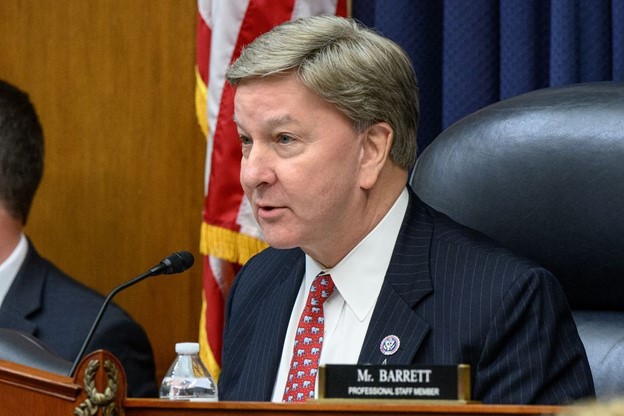
Congressman Mike Rogers (R-AL03) released a statement on China and Russia’s continued cooperation – including a recent joint naval patrol near Alaska. “Continued cooperation between China and Russia is a stark reminder of the challenge we face: for the first time in history, the United States must deter two near-peer nuclear adversaries simultaneously,” Rogers said. “It’s clear that China and Russia’s recent naval patrol was meant to intimidate the United States. By investing in the modernization of our nuclear deterrent, the bedrock of U.S. national security, the FY24 National Defense Authorization Act sends a strong message to both China and Russia: The United States cannot be intimidated.” The 2024 NDAA increases the amount of money the United States spends on nuclear weapons by 110% over FY2023 to $32 billion. China has passed the United States as the largest Navy in the world. “While this administration dithers, the CCP is rapidly growing and modernizing its navy,” Rogers said. “It already controls the largest Navy in the world. Our fleet of 296 ships was eclipsed years ago by a Chinese fleet of over 350 ships. In two short years, the DoD predicts the CCP will control over 400 battle force ships. I don’t understand how this administration can conclude reducing the size of our fleet will somehow deter China.” China has also passed the U.S. in the number of ICBM launchers deployed – though the U.S. has a larger total number of warheads. “The head of U.S. Strategic Command has informed us that China has surpassed the U.S. in the number of ICBM launchers – this should serve as a wake-up call for the United States,” Rogers and other congressional leaders wrote. “It is not an understatement to say that the Chinese nuclear modernization program is advancing faster than most believed possible. We have no time to waste in adjusting our nuclear force posture to deter both Russia and China. This will have to mean higher numbers and new capabilities.” Russia’s recent invasion of Ukraine and Russian President Vladimir Putin’s increased belligerence has effectively ended the three decades of peaceful relations between Russia and the West following the collapse of the USSR. “Putin’s unprovoked, full-scale invasion of Ukraine has lasted a year too long,” Reps. Rogers, Michael McCaul, and Mike Turner wrote. “The people of Ukraine have shown unmatched strength and courage, and with the aid of Western weaponry, they have decimated Russia’s war machine. In supporting Ukraine’s fight, House Republicans have also continued to conduct robust oversight of U.S. assistance – protecting the American taxpayer while ensuring these weapons continue to make an impact on the battlefield.” China President Xi Jinping meanwhile has been open about his own territorial ambitions toward Taiwan. President Joe Biden has said that the U.S. would intervene militarily if China were to invade Taiwan, saying the burden to protect Taiwan is “even stronger’ after Russia’s invasion of Ukraine. It was one of the most forceful presidential statements in support of self-governing in decades. Mike Rogers is the Chairman of the House Armed Services Committee that is tasked with writing the House version of the NDAA. Rogers is in his eleventh term representing Alabama’s Third Congressional District. To connect with the author of this story or to comment, email brandonmreporter@gmail.com.
Donald Trump reasserts GOP dominance as others focus on midterms
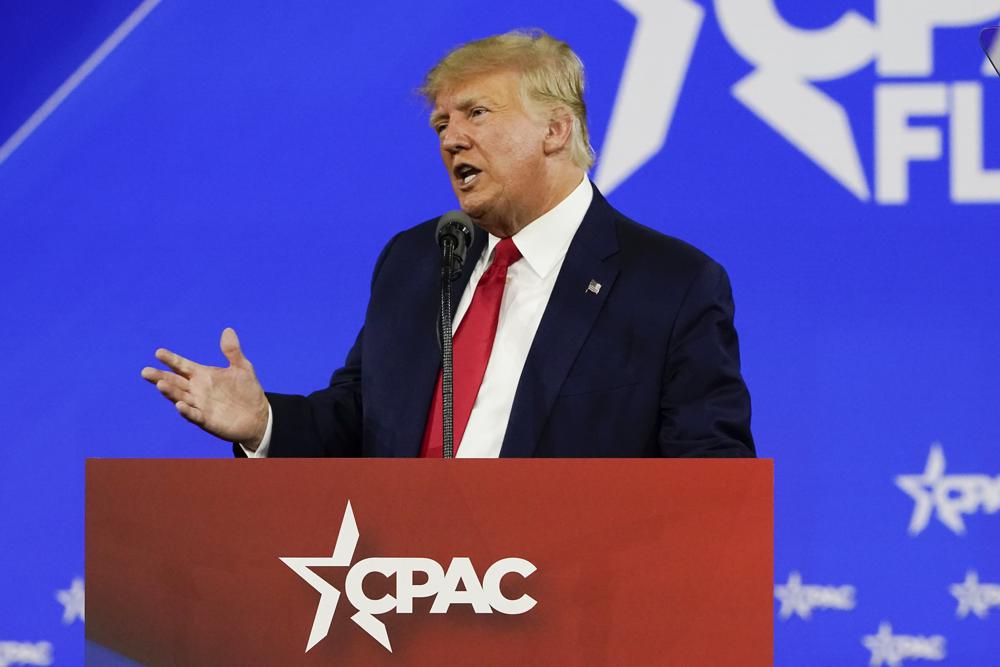
Leading Republicans spent much of three days avoiding Donald Trump’s chief grievances or ignoring him altogether as they unified behind a midterm message designed to win back the voters the polarizing former president alienated while in office. But by the end of the four-day Conservative Political Action Conference, Trump had reminded those who want to move on that he remains the most powerful voice in Republican politics. In his keynote address Saturday night, Trump indicated he planned to run for president a third time in 2024. He falsely blamed his 2020 election loss on widespread voter fraud, for which there is no evidence. And on Sunday, he was the overwhelming winner of a presidential preference straw poll of conference attendees. “We did it twice, and we’ll do it again,” Trump said of running in 2024. Even so, he has teased about a 2024 campaign before, and his vow this time was not necessarily ironclad. As invading Russian troops battled with Ukrainian forces, Trump also described Russian President Vladimir Putin as “smart.” “Of course he’s smart,” Trump said in his remarks Saturday, doubling down on praise of the Russian leader that many other Republicans have avoided after the invasion. “But the real problem is our leaders are dumb. Dumb. So dumb.” While Trump expressed support for the Ukrainian people and called the country’s president, Volodymyr Zelenskyy, a “brave man,” he also noted his ties with other leading autocrats. He specifically pointed to his friendly relationships with Xi Jinping of China and North Korean leader Kim Jong Un. Up until Trump’s appearance, lies about election fraud, the focus of last year’s conference, had been an afterthought among the top speakers. No one parroted Trump’s approving rhetoric toward Putin. And some leading Republicans didn’t even mention Trump’s name. Instead, those most likely to seek the GOP’s 2024 presidential nomination not named Trump united behind an agenda that includes more parental control of schools, opposition to pandemic-related mandates, and a fierce rejection of “woke” culture. The message from more than a half-dozen elected officials, delivered to thousands of mostly white activists at an event that usually celebrates far-right rhetoric, does not mean the party has turned its back on Trumpism. Far from it. The former president was a frequent topic among some of the conference’s lower-profile speakers. T-shirts proclaiming “Trump won” were being sold in the hallways. And in the straw poll of 2,574 conference attendees, Trump earned 59%, followed by Florida Gov. Ron DeSantis with 28%. No one else had more than 2%. When asked for their preference should Trump not run in 2024, DeSantis earned 61%, with no one else earning more than 6% of the vote. The straw poll only measured the opinion of those at the conference, not broader Republican sentiment. Aside from Trump, Florida Gov. Ron DeSantis was a crowd favorite throughout the four-day conference. Audience members applauded almost every time his name was mentioned, or his picture appeared on big screens. Conference organizer Matt Schlapp said Trump remains a dominant force, but he does not have a lock on the party’s base. “No. 1 is, Does he run again? And it’s overwhelming that people want him to,” Schlapp said. “But there’s a diversity of opinion.” And while Trump’s most controversial supporters were generally given lower-profile speaking slots over the four-day program, they were not excluded. Rep. Majorie Taylor Greene, R-Ga., appeared on a Saturday morning panel hours after being featured at a conference of pro-Trump white nationalists. Trump offered Taylor Greene a particularly warm shoutout during his speech as he ticked down the Republican officials in attendance. “I refuse to shut up,” Taylor Greene said earlier in the day during a brief appearance as she railed against “Democrat communists.” Despite Trump’s dominant place at the head of the Republican Party, other party leaders are increasingly optimistic they have found a forward-looking strategy to overcome pro-Trump extremism and expand the party’s appeal with control of Congress at stake in November. It’s essentially the same playbook that Virginia’s Republican Gov. Glenn Youngkin used last fall when he won in the swing state by avoiding Trump and his biggest grievances, including the false notion that the 2020 presidential election was plagued by mass voter fraud. “There are people that perhaps have never voted the same way any of you have in a presidential race, and they’re really angry,” Florida Sen. Marco Rubio said Friday. “And that’s why I believe that for all the negative we’ve heard, the pendulum is swinging.” Democrats are clinging to paper-thin majorities in the House and Senate, and voter sentiment has swung in an ominous direction for them since President Joe Biden took office in January 2021. In an AP-NORC poll conducted Feb. 18-21, 70% of Americans said the country was headed in the wrong direction. As few as 44% said the same in April 2021. Some leading Republicans seemed intent at CPAC on not helping Democrats by embracing Trump. Missouri Sen. Josh Hawley, who tried to block the certification of Biden’s electoral victory after the Jan. 6 Capitol attack, sidestepped a question about whether he would challenge Trump in a 2024 prospective matchup. “I’ve said I’m not planning to run for president,” Hawley said. He also declined to say whether he wants Trump to run again in 2024: “I never give him advice, including on this.” Hawley also said it was a mistake for Republicans like Trump to offer soft praise for Putin: “Putin is our enemy. Let’s be clear about that.” DeSantis, who has also refused to rule out a 2024 presidential bid should Trump run, did not mention the former president in his 20-minute address, focusing instead on his resistance to mask and vaccine mandates. Trump’s former secretary of state, Mike Pompeo, spoke about his work in the Trump administration, but he did not repeat his own recent flattering comments about Putin, in which he called the Russian leader “very capable” and said he has “enormous respect for him.” South Dakota Gov. Kristi
Fighting gas prices, U.S. to release 50 million barrels of oil

President Joe Biden on Tuesday ordered a record 50 million barrels of oil released from America’s strategic reserve, aiming to bring down gasoline and other costs, in coordination with other major energy-consuming nations including India, the United Kingdom, and China. The U.S. action is focused on helping Americans cope with higher fuel and other prices ahead of Thanksgiving and winter holiday travel. Gasoline prices are at about $3.40 a gallon, more than 50% higher than a year ago, according to the American Automobile Association. “While our combined actions will not solve the problems of high gas prices overnight, it will make a difference,” Biden promised in remarks at the White House. “It will take time, but before long, you should see the price of gas drop where you fill up your tank.” The government will begin to move barrels into the market in mid-to-late December. Gasoline usually responds at a lag to changes in oil prices, and administration officials suggested this is one of several steps toward ultimately bringing down costs. Oil prices had dropped in the days ahead of the announced withdrawals, a sign that investors were anticipating the moves that could bring a combined 70 million to 80 million barrels of oil onto global markets. But in trading after the announcement, prices shot up roughly 2% instead of falling. The market was expecting the news, and traders may have been underwhelmed when they saw the details, said Claudio Galimberti, senior vice president for oil markets at Rystad Energy. “The problem is that everybody knows that this measure is temporary,” Galimberti said. “So once it is stopped, then if demand continues to be above supply like it is right now, then you’re back to square one.” Shortly after the U.S. announcement, India said it would release 5 million barrels from its strategic reserves. The British government confirmed it will release up to 1.5 million barrels from its stockpile. Japan and South Korea are also participating, and U.S. officials said it’s the biggest coordinated release from global strategic reserves. British Prime Minister Boris Johnson’s spokesman, Max Blain, said it was “a sensible and measured step to support global markets” during the pandemic recovery. Blain added that the country’s companies will be authorized but not compelled to participate in the release. Despite all the optimistic statements, the actions by the U.S. and others risk counter moves by Gulf nations, especially Saudi Arabia, and by Russia. Saudi Arabia and other Gulf countries have made clear they intend to control supply to keep prices high for the time being. As word spread in recent days of a coming joint release from the U.S. and other countries’ reserves, there were warnings from OPEC interests that those countries may respond in turn, reneging on promises to increase supplies in coming months. Wyoming Sen. John Barrasso was among Republicans who criticized Biden’s announcement. The No. 3 Senate Republican said the underlying issue is restrictions on domestic production by the administration. “Begging OPEC and Russia to increase production and now using the Strategic Petroleum Reserve are desperate attempts to address a Biden-caused disaster,” Barrasso said. “They’re not substitutes for American energy production.” Biden has scrambled to reshape much of his economic agenda around the issue of inflation, saying that his recently passed $1 trillion infrastructure package will reduce price pressures by making it more efficient and cheaper to transport goods. Republican lawmakers have hammered the administration for inflation hitting a 31-year high in October. The consumer price index has soared 6.2% from a year ago — the biggest 12-month jump since 1990. The Strategic Petroleum Reserve is an emergency stockpile to preserve access to oil in case of natural disasters, national security issues, and other events. Maintained by the Energy Department, the reserves are stored in caverns created in salt domes along the Texas and Louisiana Gulf Coasts. There are roughly 605 million barrels of petroleum in the reserve. The Biden administration argues that it is the right tool to help ease the supply problem. Americans used an average of 20.7 million barrels a day during September, according to the Energy Information Administration. That means that the release equals about two-and-a-half days of additional supply. “Right now, I will do what needs to be done to reduce the price you pay at the pump,” Biden said at the White House. He said the administration also is looking into potential price gouging by gas companies squeezing customers while making money off the lowered oil costs. Energy Secretary Jennifer Granholm, too, said U.S. companies are part of the problem, keeping production below pre-pandemic levels in order to increase profits. The coronavirus pandemic roiled energy markets everywhere. As it bore down and economic activity sank in April of last year, energy demand collapsed, and oil futures prices turned negative. Energy traders did not want to get stuck with crude that they could not store. But as the economy recovered, production lagged, and prices jumped to a seven-year high in October. U.S. production has not recovered. Energy Information Administration figures indicate that domestic production is averaging roughly 11 million barrels daily, down from 12.8 million before the pandemic. Americans are feeling the squeeze. For Matt Hebard of Agoura Hills, California, it’s taking $80 to gas up his SUV. “Gas prices are definitely on everyone’s minds right now,” he said as he filled up at a station in his suburb northwest of Los Angeles. He hoped the president’s move has a good long-term effect. Sy Amber, meanwhile, was en route to Las Vegas from his California home. Unhappily spending more money filling up his car, he said he didn’t expect Biden’s action to work and didn’t agree with them. “I’m not happy with our president,” he said. Republicans in Congress are pointing to Biden’s efforts to minimize drilling and support renewable energy as a reason for the decreased production, though there are multiple market dynamics at play as fossil fuel prices are higher around the world. Biden and administration officials insist that tapping more oil from the
John Bolton critique of Donald Trump could define tell-all book battles

The government asked a federal court for a temporary restraining order to prevent the release of the book.
John Bolton says Donald Trump asked China to help him get reelected
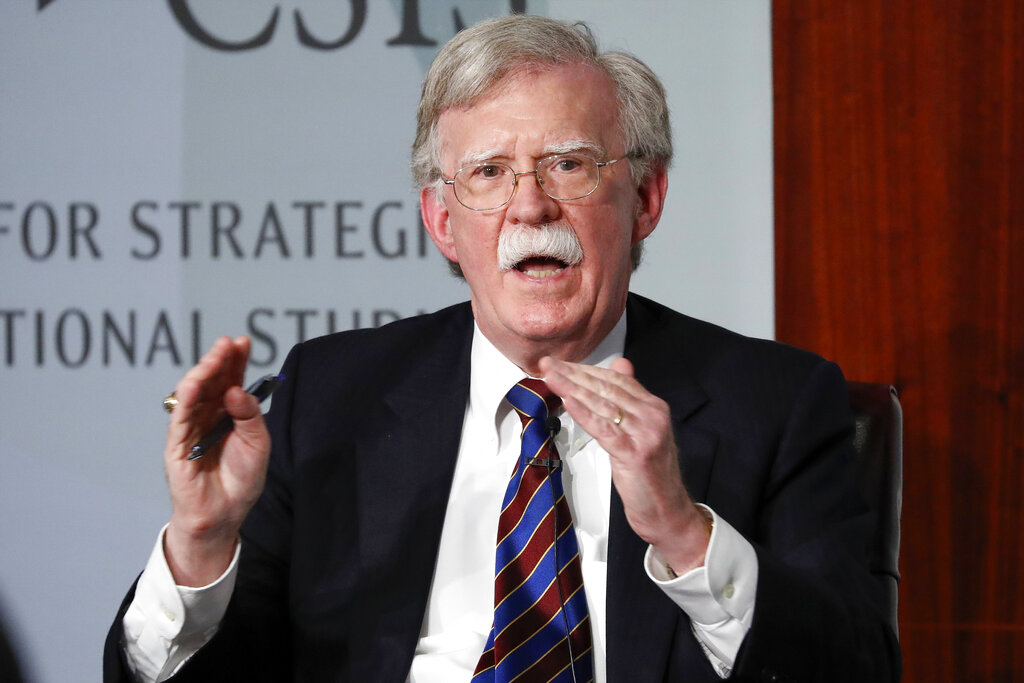
The White House worked furiously to block the book, asking a federal court for an emergency temporary restraining order Wednesday against its release.
Signs missed and steps slowed in Trump’s pandemic response
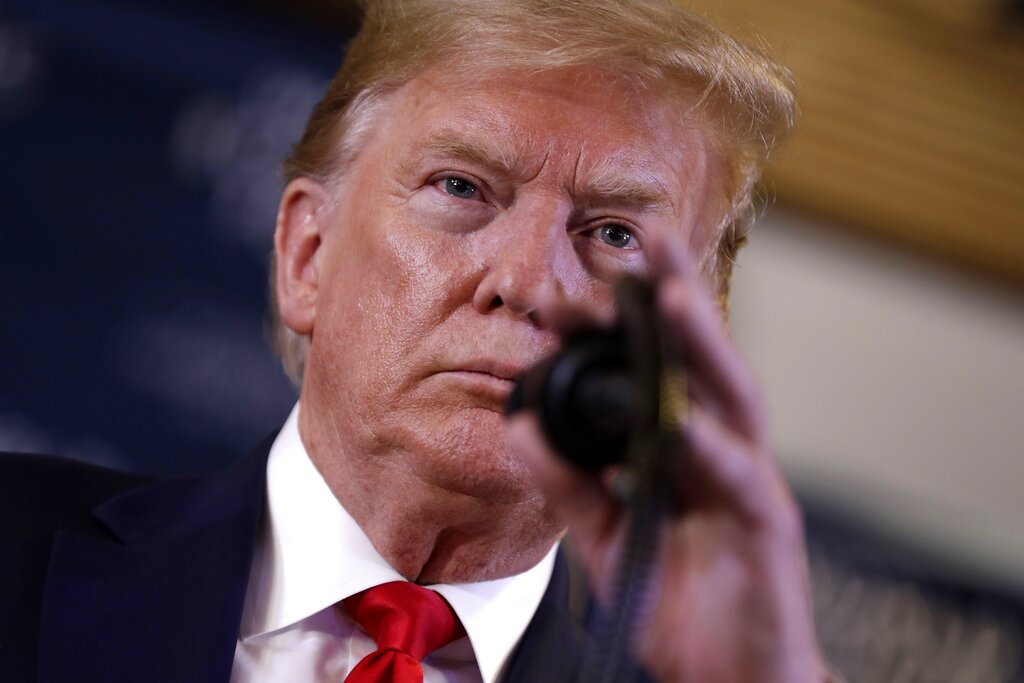
“We have it totally under control,” Trump said on CNBC.
Donald Trump faces credibility test as he plays down virus threat

Trump conducted a lengthy press conference Wednesday evening aimed at reassuring everyone that he has the crisis well in hand.
Donald Trump’s push for tariffs squeezes a weakening global economy
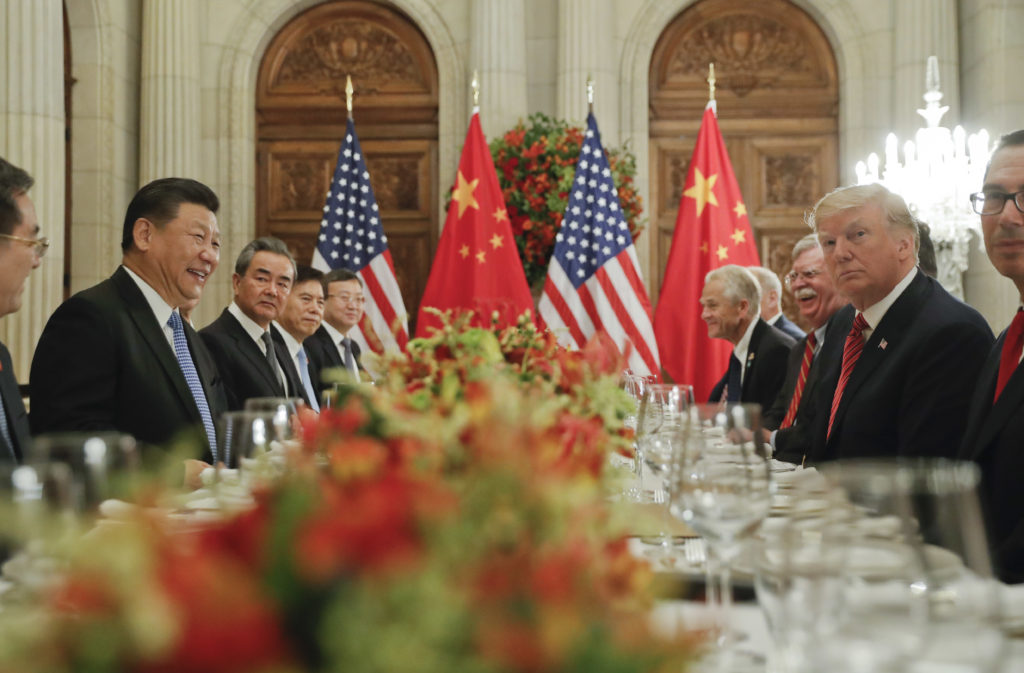
The global economy was already showing signs of a slowdown when President Donald Trump reminded the world of his love of tariffs and sent a chill through financial markets. “I am a Tariff Man,” Trump announced Tuesday to signal his devotion to import taxes — a remark that served to downplay the likelihood of ending his trade war with China. Stocks sank across the world, in part over fear that an escalation in tariffs would choke off economic growth and possibly send a global slowdown into a recession. By Wednesday, Tariff Man had tweaked his message to suggest more optimism on the odds of forging a deal with President Xi Jinping. Their meeting last weekend at an economic conference in Argentina produced a 90-day truce, a suspension of further increases in U.S. tariffs on Chinese goods and a pledge by Beijing to buy more U.S. goods. “Not to sound naive or anything, but I believe President Xi meant every word of what he said at our long and hopefully historic meeting,” Trump tweeted. “ALL subjects discussed!” Still, Trump’s rattling of the global economy came at a precarious moment, with the economic outlook for 2019 dimming and concerns about a potential recession — if not next year then soon thereafter — rising. The economic stimulus from U.S. tax cuts is beginning to fade. Britain is struggling to leave the European Union. Italy’s debt is widening. China is trying to navigate a slowdown after decades of unsustainably fast growth. Germany, Europe’s largest economy, shrank in its most recent quarter. Global growth was already slated to slip to 3.5% next year from 3.7% even without accounting for the risks of escalating U.S. tariffs and China’s counter-tariffs, according to estimates by the Organization for Economic Cooperation and Development, an intergovernmental think tank of 36 nations. Now, businesses, consumers and nations must account for the chaotic confusion injected by Trump’s evolving and conflicting messages about his administration’s trade relationship with Beijing, said Ian Shepherdson, chief economist at Pantheon Macroeconomics. Shepherdson worries that the president’s fondness for tariffs might itself be enough to further suppress growth. “The uncertainty caused by the whipsawing of his trade stance means that business investment will be delayed or canceled, marginal hiring decisions will be postponed and potential overseas business partners will look elsewhere,” Shepherdson said. Trump imposed tariffs of 10% on $200 billion worth of Chinese goods in September. Those tariffs were set to rise to 25% on Jan. 1. The president had also threatened to impose tariffs on essentially all the remaining goods from China that aren’t already subject to his higher tariffs. The Trump-Xi dinner negotiations, though, led the two sides to hit pause and agree to 90 days of negotiations. Trump says he wants to shrink a gaping $336 billion U.S. trade deficit with Beijing — the gap between how much America buys from China and how much it sells — and stop the Chinese from stealing or forcing the handover of U.S. technology and intellectual property. Complicating the problem is that all this is happening against the backdrop of weakening growth around the world. The economy of the 19 countries that use the euro currency, for example, stumbled in the July-September period. Its quarterly growth halved to 0.2%. Worries escalated after data showed that the economies of Italy and Germany, which relies on global exports, shrank during the quarter. “The global picture is getting murkier, and that’ll impact the eurozone via trade and sentiment,” Erik Nielsen, chief economist at UniCredit bank, said in a note to clients. Italy is suffering from uncertainty over its economic outlook under a new populist government. The government wants to raise public spending, thereby adding to its huge debt load of over 130% — and even rekindling concerns of a return of Europe’s debt crisis. Brexit, meanwhile, is an unknown, with Britain in the midst of political turmoil. It’s possible that it could leave the EU without any deal on future relations involving trade. That’s a worst-case scenario that would immediately establish tariffs and customs checks on hundreds of billions of dollars in exports between Britain and the 27 other EU nations. White House aides have suggested that Trump is promoting tariffs merely as a tool to forge agreements that would actually eliminate all import taxes. And at the opening of this week, the administration was already claiming progress with China on the purchase of $1.2 trillion worth of U.S. goods — even though White House officials couldn’t supply any meaningful details. “President Trump regards himself as a trade reformer,” Larry Kudlow, director of the White House National Economic Council, told reporters Monday. “He wants a world of zero tariffs and zero non-tariff barriers and zero subsidies.” Then, on Tuesday, Trump seemed to thumb his nose at that White House talking point by dubbing himself “Tariff Man.” “When people or countries come in to raid the great wealth of our Nation,” he tweeted, “I want them to pay for the privilege of doing so.” Those words helped trigger a dizzying sell-off Tuesday. The Dow Jones Industrial Average shed about 800 points — 3.1%. U.S. financial markets were closed Wednesday for the funeral of former President George H.W. Bush. But stock indexes in Britain, Germany, France, Hong Kong, Shanghai, Japan, Australia, South Korea and India tumbled. The problem for the global economy is that tariffs tend to inflate prices, depress trade and reduce the incomes of everyday workers. That’s because companies must either absorb the higher costs created by tariffs or pass them on to their customers. The Tax Foundation, a conservative think tank, studied the $42 billion of tariffs already imposed by Trump, which include taxes on steel, aluminum, washing machines and the duties being charged on Chinese imports. Its analysis, released Wednesday, concluded that these tariffs had reduced incomes by an average of $146 for taxpayers who earn between $27,740 and $43,800. The tariffs also cut U.S. hiring by the equivalent of 94,300 full-time jobs. If Trump proceeds with
Trade rocks already unstable U.S., China relations
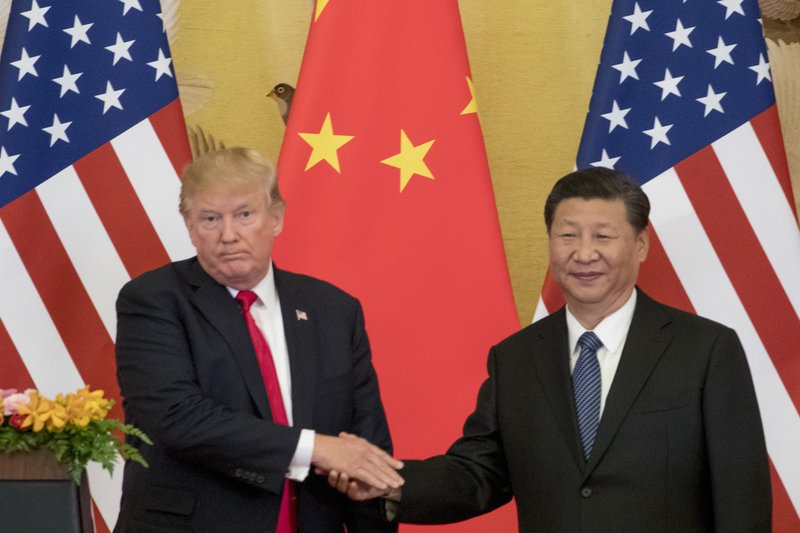
President Donald Trump’s trade battle with China will exacerbate relations with Beijing that are already fraying on several fronts as the U.S. takes a more confrontational stance and an increasingly powerful China stands its ground. The gloves came off Friday as the world’s two largest economies imposed tariffs on billions of dollars of each other’s goods amid a spiraling dispute over technology. It comes at a time when Washington needs China’s help in ending its nuclear standoff with North Korea. Trump’s much-vaunted personal rapport with Chinese President Xi Jinping, whom he hosted at his Mar-a-Lago resort three months after taking office, won’t help patch up differences, experts and former officials say. “The notion that there’s a personal relationship which will somehow supersede China’s strategic interests and the well-being of the Communist Party — including its ability to manage its own economy consistent with its political interests — is absurd,” said Daniel Russel, top U.S. diplomat for East Asia under President Barack Obama. “There’s no scenario in which an affectionate relationship, real or imagined, is going to stay Xi’s hand,” Russel said. Troubles in the bilateral relationship go beyond trade. China has chafed about the scope of U.S. relations with Taiwan; U.S. complaints about its construction of military outposts on islands in the South China Sea; tougher screening of Chinese investment in the U.S.; visa restrictions; and accusations that it’s the main source of opioids. If not new, these are now deepening sources of tension between Washington and Beijing. Even as Trump has sought to cultivate his relationship with the increasingly dominant Chinese leader, his administration has chosen to confront an increasingly defiant China on pretty much all them. It also identified China, along with Russia, as a threat in the most recent U.S. National Security Strategy. In response, Beijing is hanging tough. “China has made it abundantly clear that it will never surrender to blackmail or coercion,” Chinese state news agency Xinhua said Friday. To what extent the trade tensions bleed into other aspects of the U.S.-China relationship, which has retained a mostly upward trajectory since the normalization of ties four decades ago, remains to be seen. But Mike Pillsbury, director of the Center for Chinese Strategy at the Hudson Institute, said U.S.-China relations are headed into “uncharted waters.” Recently returned from a visit to China, Pillsbury said he was told by government officials and businessmen that they were confused about what the Trump administration wanted them to do to get the U.S. to ease the trade tensions. They threatened to back off assisting the U.S. nuclear talks with North Korea. “They explicitly said that,” according to Pillsbury, who has written three books on China and has advised the Trump administration. “They said we will help you (the U.S.) less with North Korea if you start a trade war with us on July 6. Pretty clear, huh?” China has, in fact, already distanced itself somewhat from its significant cooperation with the U.S. on North Korea. After supporting tough U.N. sanctions and scaling back trade with the North after it ramped up nuclear and missile tests last year, Beijing has eased restrictions on its neighbor. That shift began after Trump in March abruptly decided to hold a summit with Kim Jong Un. Once again, China has again focused on rekindling its traditional alliance with Pyongyang — Xi has met Kim three times this year. Abraham Denmark, a former senior U.S. defense official on Asia, said China has welcomed Trump’s sudden shift from confrontation to diplomacy with North Korea and also his decision to halt large-scale military exercises with close U.S. ally South Korea. Yet China also views what happens with North Korea through the lens of the geopolitical rivalry between the U.S. and China, he said. North Korea long served as a buffer against America’s expanding its reach in Northeast Asia to China’s border. “If the U.S. is going to engage in a trade war, which is very troubling for China, politically, it’s going to reduce their willingness to cooperate on North Korea,” he said. Denmark, who is now director of the Asia program at the Wilson Center think tank, warned of a broader deterioration in relations, as Trump pursues more aggressive policies toward Beijing, and China stakes out a position as world player unwilling to be pushed around. “China under Xi Jinping has been more aggressive in its pursuit of its interests. I expect we’re going to see more tensions across the board: in trade, the South China Sea, Taiwan, Korea,” Denmark said. “These are all part of the same story, which is that China is feeling more confident and powerful, and more willing to accept friction and tension in the pursuit of its interests.” On recent trip to China, Defense Secretary Jim Mattis did some damage mitigation, talking up the importance of military cooperation despite his earlier decision to withdraw an invite for China to participate in a U.S.-led multinational naval exercise over its activities in the disputed South China Sea. Xi struck a similar note, calling military ties a “model component of our overall bilateral relations.” That may help to ward off the possibilities of unintended conflict between the two militaries, but it will not prevent a growing rift on other issues. The United States accuses China of using predatory tactics in a push to supplant American technological dominance. The tactics include forcing U.S. companies to hand over technology in exchange for access to the Chinese market, as well as outright cyber-theft. Trump’s tariffs are meant to pressure Beijing to reform its trade policies. On Friday, the Trump administration imposed tariffs on $34 billion worth of Chinese products. Within hours, China retaliated with taxes on an equal amount of U.S. products, including soybeans, pork and electric cars. Russel said that ultimately the Trump administration’s issuing of demands of China on trade and other issues could harden attitudes inside the country, weakening the hands of reformers and strengthening nationalists who vilify the United States. “The net effect of
In tit-for-tat, Donald Trump threatens more tariffs against China
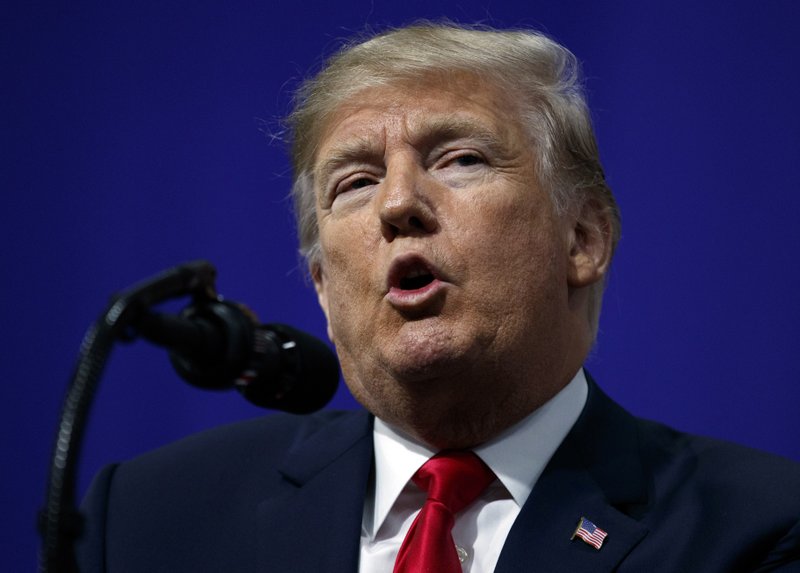
President Donald Trump has directed the U.S. Trade Representative to prepare new tariffs on $200 billion in Chinese imports as the two nations move closer to a potential trade war. The tariffs, which Trump wants set at a 10 percent rate, would be the latest round of punitive measures in an escalating dispute over the large trade imbalance between the two countries. Trump recently ordered tariffs on $50 billion in Chinese goods in retaliation for intellectual property theft. The tariffs were quickly matched by China on U.S. exports, a move that drew the president’s ire. “China apparently has no intention of changing its unfair practices related to the acquisition of American intellectual property and technology,” Trump said in a statement Monday announcing the new action. “Rather than altering those practices, it is now threatening United States companies, workers, and farmers who have done nothing wrong.” Trump added: “These tariffs will go into effect if China refuses to change its practices, and also if it insists on going forward with the new tariffs that it has recently announced.” China’s Commerce Ministry on Tuesday criticized the latest threat of tariffs, saying it was an “act of extreme pressure and blackmail that deviates from the consensus reached by both parties after many negotiations, and is a disappointment to the international community.” “If the U.S. becomes irrational and issues this list, China will have no choice but to adopt strong countermeasures of the same amount and quality,” the ministry statement said. Trump said that if China responds to this fresh round of tariffs, then he will move to counter “by pursuing additional tariffs on another $200 billion of goods.” It wasn’t immediately clear when the new tariffs could be put in place, as the trade office has yet to identify the Chinese goods to be penalized or conduct a legal review. The first round of penalties announced by both nations is set to take effect July 6. The intellectual property sanctions were the latest in a spate of protectionist measures unveiled by Trump in recent months that included tariffs on steel and aluminum imports to the U.S. and a tough rhetoric on trade negotiations from North America to Asia. The escalation in the dispute with China may also serve as a warning to other trading partners with whom Trump has been feuding, including Canada and the European Union. The move quickly drew praise from former Trump senior adviser Steve Bannon, who told The Associated Press: “President Trump told China and the world tonight that America will not back down when it comes to economic aggression.” But Wall Street has viewed the escalating trade tensions with wariness, fearful they could strangle the economic growth achieved during Trump’s watch. Gary Cohn, Trump’s former top economic adviser, said last week that a “tariff battle” could result in price inflation and consumer debt — “historic ingredients for an economic slowdown.” Trump’s comments came hours after the top U.S. diplomat accused China of engaging in “predatory economics 101” and an “unprecedented level of larceny” of intellectual property. Secretary of State Mike Pompeo made the remarks at the Detroit Economic Club as global markets reacted to trade tensions between the U.S. and China. He said China’s recent claims of “openness and globalization” are “a joke.” He added that China is a “predatory economic government” that is “long overdue in being tackled,” matters that include IP theft and Chinese steel and aluminum flooding the U.S. market. “Everyone knows … China is the main perpetrator,” he said. “It’s an unprecedented level of larceny.” “Just ask yourself: Would China have allowed America to do to it what China has done to America?” he said later. “This is predatory economics 101.” Asked to comment on Pompeo’s remarks, the Chinese foreign ministry in Beijing said in a regular briefing with reporters that the U.S. had lost credibility as a free trader. “We don’t want a trade war, but we’re not afraid of a trade war,” ministry spokesman Geng Shuang said. Pompeo raised the trade issue directly with China last week, when he met in Beijing with President Xi Jinping and others. “I reminded him that’s not fair competition,” Pompeo said. Trump had announced a 25 percent tariff on up to $50 billion in Chinese imports. China is retaliating by raising import duties on $34 billion worth of American goods, including soybeans, electric cars and whiskey. Trump also has slapped tariffs on steel and aluminum imports from Canada, Mexico and European allies. Pompeo on Monday described U.S. actions as “economic diplomacy,” which, when done right, strengthens national security and international alliances, he added. “We use American power, economic might and influence as a tool of economic policy,” he said. “We do our best to call out unfair economic behaviors as well.” In a statement, Trump says he has an “excellent relationship” with Xi, “but the United States will no longer be taken advantage of on trade by China and other countries in the world.” Republished with the permission of the Associated Press.


